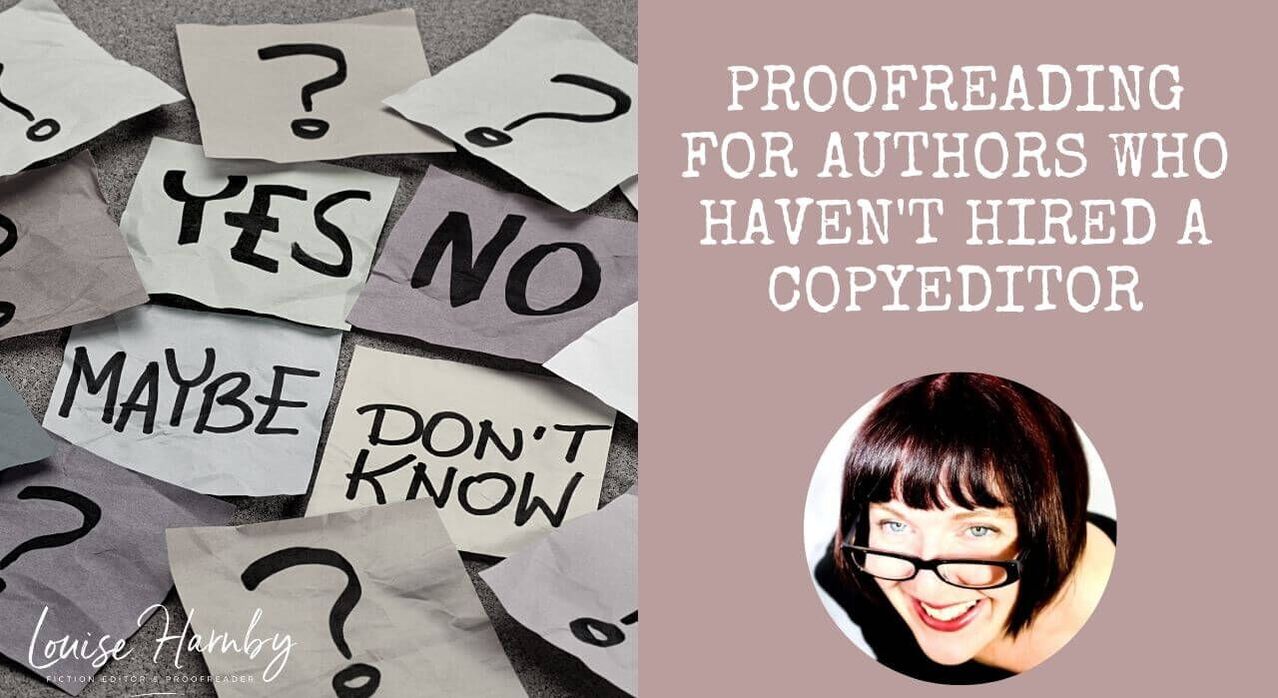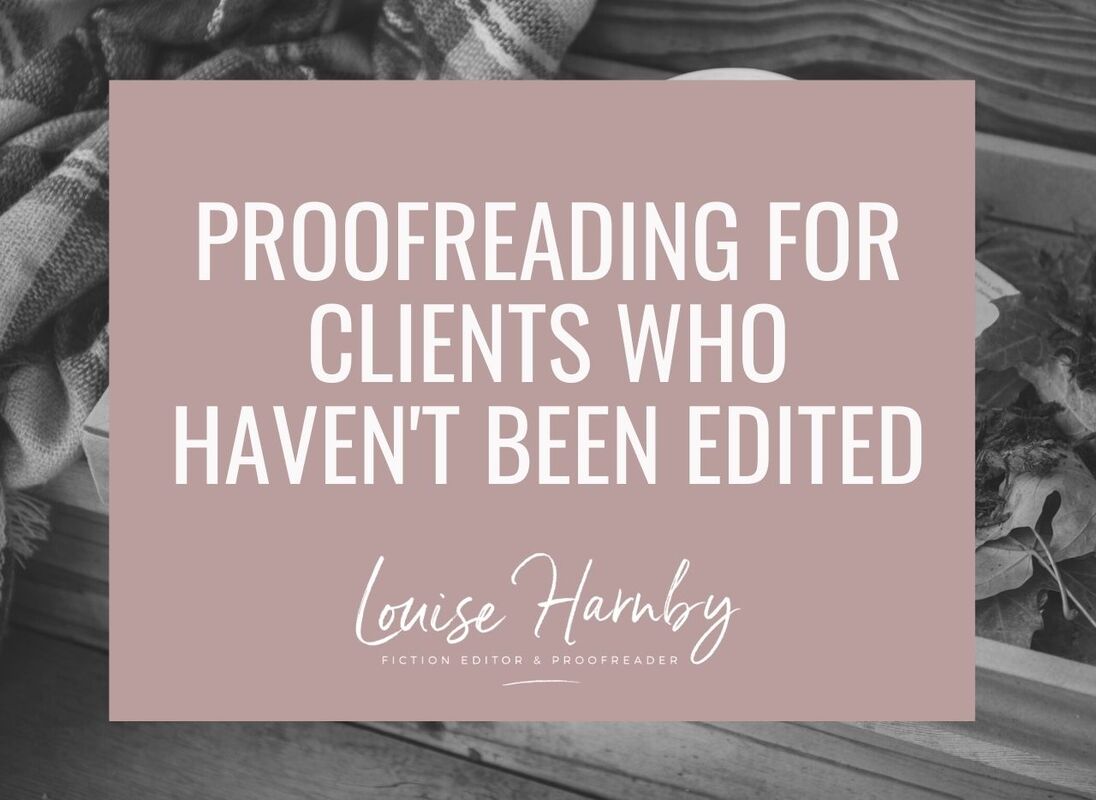|
In this article, I take a look at proofreading for self-publishers, and the conundrum that can arise when the author hasn't invested in previous rounds of editing.
If you’re a proofreader, it’s likely that you’ve been asked to proofread for a self-publishing author who hasn’t had their work taken through professional substantive, line and copy-editing. I certainly have.
This situation may have arisen for one of several reasons:
So, if he or she wishes to, should a proofreader work with clients who fall into the above categories? Before answering that question, it’s worth considering what we mean when we use terms to describe editorial skillsets, and whether our clients have the same understanding. Redefining proofreading Says the Society for Editors and Proofreaders (SfEP), “After material has been copy-edited, the publisher sends it to a designer or typesetter. Their work is then displayed or printed, and that is the proof – proof that it is ready for publication. Proofreading is the quality check and tidy-up” (“FAQs: What is proofreading”, SfEP). Of note is the fact that the proofreader is not directly editing the files; rather, we are annotating them (this applies to both paper proofs and PDFs). See “Not all proofreading is the same: Part I – Working with page proofs” (Proofreader’s Parlour) for a more comprehensive discussion of the process of traditional proofreading. However, these days, many clients such as academics, businesses and independent, self-publishing authors want something rather different. Often, they’ll supply raw-text files and want the proofreader to directly amend the text. They may ask the proofreader to format the various text elements, make the majority of style decisions, even tweak awkward sentences. This is referred to as proof-editing in some professional editorial circles. In such cases, “[t]he proofreader has to explore what is required and negotiate a budget and schedule that allow for more editorial decisions and intervention” (“FAQs: What is proofreading”, SfEP). Client understandings and usage Those of us who own our own editorial businesses recognize that the professional terminology we use to communicate how we can solve a client’s problems doesn’t always match the client's understanding and usage. Consider the following:
It’s for that reason that I don’t use the term “proof-editing” on my website to describe the service I offer to self-publishing authors, even though it’s exactly what I do for many of them. Instead, I offer them a “proofreading” service and I refer to myself as a “proofreader”. In contrast, when publishers contact me about proofreading work, I know I’m usually going to be working with page proofs and that my brief will, broadly speaking, require me to carry out the kinds of pre-publication checks that proofreading, traditionally defined, demands. Should the proofreader accept or decline non-edited proofreading work? My view is that this is the wrong question. Rather, the questions should be:
If the answer to those questions is yes, and the client and the proofreader agree mutually acceptable terms (of level of intervention, fee, schedule, etc.), I see no reason why a proofreader should not work for self-publishing authors who haven’t hired an editor beforehand. Offering a professional service Offering a professional editorial service involves:
Listening and talking to the client If the author has commissioned a structural editor and copy-editor before hiring the proofreader, is the text in better shape? Assuming these editors were competent professionals, I think that in almost all cases the answer is yes. However, that isn’t always what the client wants (and, occasionally, dare I say it, it may not even be what the client needs, though that is beyond the scope of this article). Here’s a fictive example, but one that I’m sure will chime with many of us in real-world practice.
The thing about me is that I know how to drive a car, keep it clean, ensure the oil is topped up, mend a broken headlight, and change a tyre. I also know when the brakes aren’t working properly. However, I don’t have the skill to fix the brakes – for that, I need a qualified mechanic. What do I do?
What does she do?
As far as I’m concerned, it’s a goer. I’ve made it clear what I can and can’t do. She’s made it clear what she wants. We’ve agreed terms. Will the book be as good at it could have been? No. But she knows this. This is a journey for her, a first stage, an experiment. Right now, proofreading is good enough for her. And it doesn’t actually matter whether someone else thinks she absolutely should have invested in an editor; she has the right to put her work out there anyway. She’s chosen to do so in a way that has attended to the micro issues that a proofreader deals with rather than the macro issues that an editor could have fixed. That’s her informed choice. Me? I’m delighted to have secured a new client, and to work with her in the only way I’m able to – as a proofreader. I’ve done my best to provide guidance so that she’s better informed next time around, and I’ve respected her choices this time around. It’s a win–win. This isn't always the outcome, of course. There will be times when the proofreader, after an assessment of the sample provided by the author, feels so overwhelmed by the task in hand that there is no option other than to decline the work. In this case, it is not in the best interests of either the proofreader or the client to proceed. Cost-effective client education for the editorial business owner One of the problems editorial professionals face is the cost-effectiveness of educating inexperienced authors. Time is money, and I’m running a business, not a charity. If I spend an hour providing one-on-one detailed guidance to a potential client, that time is unbillable. And if that detailed guidance involves encouraging them to commission other editorial professionals who have the appropriate skillsets, and I’m successful in my recommendations, in effect I’m paying for a colleague to be hired. That’s great for the author, and great for the colleague, but for me it’s like throwing money out of the window – I could have used that hour to do paying work. If that’s a problem you find yourself running into, consider creating generic resources that explain the issues at stake, and then refer your potential clients to them. This will enable you to reduce the amount of unbillable time that you spend on education. Placing those resources on your website will also reflect your willingness provide accessible value-added content that demonstrates professional expertise and the desire to help. Examples might include:
Summing up
Louise Harnby is a line editor, copyeditor and proofreader who specializes in working with crime, mystery, suspense and thriller writers.
She is an Advanced Professional Member of the Chartered Institute of Editing and Proofreading (CIEP), a member of ACES, a Partner Member of The Alliance of Independent Authors (ALLi), and co-hosts The Editing Podcast. Visit her business website at Louise Harnby | Fiction Editor & Proofreader, say hello on Twitter at @LouiseHarnby, connect via Facebook and LinkedIn, and check out her books and courses.
10 Comments
2/3/2016 12:52:51 am
Oh Louise! Your post today hit the spot for me...
Reply
Louise Harnby
2/3/2016 09:46:09 am
Detail tolerance - I love that and am going to use it, Maria!
Reply
2/3/2016 10:43:03 am
Louise, this is a FANTASTIC post. A topic that, I think, all editorial professionals who work with self-publishers struggle with. I'll be coming back to this in the future when I have some time to work more thoroughly on some of the suggestions you've made.
Reply
Louise Harnby
2/3/2016 12:30:35 pm
Cheers, Sophie! I agree that we all have to find our own ways of tackling this. I think the issue for someone who is an editor, rather than a proofreader, takes on a new dimension, so it's really useful to have your viewpoint. And as I mentioned near the end of the article, there are times when a proofreader (or proofeditor) simply won't be able to meet the author's needs. In that case, I do refer the client to colleagues.
Reply
Joanna Porter
7/3/2016 02:32:14 pm
Many thanks for this post, Louise. I am a newbie proofreader with a high detail tolerance but not the skill to offer developmental editing, and am wondering whether to offering my services to the self-publishing fiction writers, so this has really hit the spot for me. Sophie's comments are also something to think about...
Reply
Louise Harnby
7/3/2016 02:50:12 pm
I do think it's a market worth exploring, Joanna. I have extensive experience in this field. Many of my clients do work with development editors first. Some send their manuscripts for editorial review but don't then go on to hire what we would call a copy-editor. Instead, they come to me. They are talented writers, and this system works for them. As long as all parties are clear about what can and can't be done, I think this is an exciting opportunity for many proofreaders who are prepared to put aside the traditional publisher-based definitions of what proofreading entails. Good communication is key at all stages!
Reply
Philip Kelly
6/2/2017 03:20:20 pm
Hi Louise,
Reply
Philip Kelly
6/2/2017 03:24:50 pm
Hi Louise,
Reply
6/2/2017 04:29:50 pm
Difficult to advise, Phil, without knowing what you mean by protracted efforts! Have you tried tapping your existing clients on the shoulder? Have you dropped your details into new publishers? What about other marketing activities? Do you advertise online anywhere (e.g. findaproofreader or, if you're a member, the SfEP directory? Have you read my marketing book and explored all the options in there? I have a new primer on content marketing out, too, though CM is a slow-burn approach and is unlikely to offer solutions in the short term
Reply
Leave a Reply. |
BLOG ALERTSIf you'd like me to email you when a new blog post is available, sign up for blog alerts!
TESTIMONIALSDare Rogers'Louise uses her expertise to hone a story until it's razor sharp, while still allowing the author’s voice to remain dominant.'Jeff Carson'I wholeheartedly recommend her services ... Just don’t hire her when I need her.'J B Turner'Sincere thanks for a beautiful and elegant piece of work. First class.'Ayshe Gemedzhy'What makes her stand out and shine is her ability to immerse herself in your story.'Salt Publishing'A million thanks – your mark-up is perfect, as always.'CATEGORIES
All
ARCHIVES
July 2024
|
|
|
|

















 RSS Feed
RSS Feed





